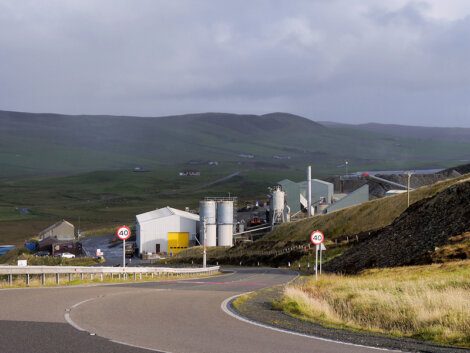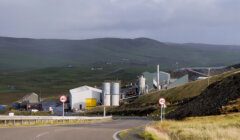Council / Cost of Scord Quarry production rises at ‘unprecedented rate’
Councillors have agreed to increase charges at the quarry to ensure the service is sustainable
PRODUCTION costs at the Scord Quarry have increased at an “unprecedented rate” in recent months as a result of world events and the price of fuel and bitumen.
Legislation brought into effect in April which stops the use of rebated “red” diesel, or gas oil, in quarrying operations has also led to “considerable increases in fuel costs”
This has led to operator Shetland Islands Council increasing charges for materials from the quarry.
The largest customer of the quarry is the council’s own roads service, but it also serves the wider construction industry.
A report to councillors this week said the cost of bitumen has risen from £579 per tonne to £794 since the quarry’s 2022/23 charge list was approved in February.
This represents a 37 per cent increase. Last year the quarry used 900 tonnes of bitumen, and if this was replicated again the cost of producing coated roadstone would rise by nearly £200,000 this year.
The price of kerosene, which is used in the production of bitmac and fuels the main dryer at the quarry, has risen from 49.47p per litre to 83.85p since February.
Last year the quarry used 150,000 litres, and assuming a similar production the cost of producing coated roadstone would raise by just over £50,000 this year.
The Scord Quarry, in Scalloway, is the only local supplier of bitmac, which is used in road surfacing.
The cost of electricity has also seen an increase of around 22.5 per cent, which meant an expected rise of around £19,000 this year should production levels be maintained.
The report to elected members said if the quarry was to operate at a loss, this would impact on road maintenance budgets.
The largest percentage increase in quarry charges is hardcore – which is rising from £4.24 per tonne to £9, a variation of 112 per cent.
Become a member of Shetland News
Chippings have a fairly modest increase, of 2.68 per cent, but many other prices stand at around 20 per cent.
Roads manager Dave Coupe told a meeting of the full council on Wednesday that prices could be reduced should production costs come down.
Officers are also exploring a “pragmatic mechanism”, as part of the wider review of the council’s constitutional framework, that would allow a service to vary prices mid-way through a financial year “without inadvertently distorting local markets and competition”.
Become a member of Shetland News
Shetland News is asking its many readers to consider paying for membership to get additional features and services: -
- Remove non-local ads;
- Bookmark posts to read later;
- Exclusive curated weekly newsletter;
- Hide membership messages;
- Comments open for discussion.
If you appreciate what we do and feel strongly about impartial local journalism, then please become a member of Shetland News by either making a single payment, or setting up a monthly, quarterly or yearly subscription.











































































